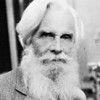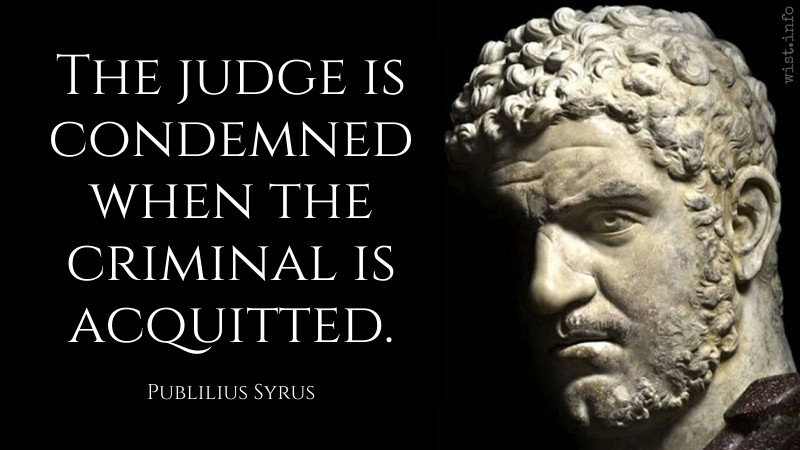In the meanest mortal there lies something nobler. The poor swearing soldier, hired to be shot, has his “honor of a soldier,” different from drill-regulations and the shilling a day. It is not to taste sweet things, but to do noble and true things, and vindicate himself under God’s Heaven as a god-made Man, that the poorest son of Adam dimly longs. Show him the way of doing that, the dullest day-drudge kindles into a hero. They wrong man greatly who say he is to be seduced by ease.
Thomas Carlyle (1795-1881) Scottish essayist and historian
Lecture (1840-05-08), “The Hero as Prophet,” Home House, Portman Square, London
(Source)
The lecture notes were collected by Carlyle into On Heroes, Hero-Worship, & the Heroic in History, Lecture 2 (1841).
Quotations about:
trial
Note not all quotations have been tagged, so Search may find additional quotes on this topic.
A trial for heresy means that the spirit of persecution still lingers in the church; that it still denies the right of private judgment; that it still thinks more of creed than truth, and that it is still determined to prevent the intellectual growth of man. It means that churches are shambles in which are bought and sold the souls of men. It means that the church is still guilty of the barbarity of opposing thought with force. It means that if it had the power, the mental horizon would be bounded by a creed; that it would bring again the whips and chains and dungeon keys, the rack and fagot of the past.
Robert Green Ingersoll (1833-1899) American lawyer, freethinker, orator
Lecture (1874-05-03), “Heretics and Heresies,” Free Religious Society, Kingsbury Hall, Chicago
(Source)
Collected in The Gods and Other Lectures (1876).
When a twelfth-century youth fell in love he did not take three paces backward, gaze into her eyes, and tell her she was too beautiful to live. He said he would step outside and see about it. And if, when he got out, he met a man and broke his head — the other man’s head, I mean — then that proved that his — the first fellow’s — girl was a pretty girl. But if the other fellow broke his head — not his own, you know, but the other fellow’s — the other fellow to the second fellow, that is, because of course the other fellow would only be the other fellow to him, not the first fellow who — well, if he broke his head, then his girl — not the other fellow’s, but the fellow who was the — Look here, if A broke B’s head, then A’s girl was a pretty girl; but if B broke A’s head, then A’s girl wasn’t a pretty girl, but B’s girl was. That was their method of conducting art criticism.
Jerome K. Jerome (1859-1927) English writer, humorist [Jerome Klapka Jerome]
Idle Thoughts of an Idle Fellow, “On Being Idle” (1886)
(Source)
I don’t like people who have never fallen or stumbled. Their virtue is lifeless and of little value. Life hasn’t revealed its beauty to them.
Boris Pasternak (1890-1960) Russian poet, novelist, and literary translator
Doctor Zhivago [До́ктор Жива́го], Part 2, ch. 13 “Opposite the House of Sculptures,” sec. 12 [Yury] (1955) [tr. Hayward & Harari (1958), US ed.]
(Source)
Alternate translations:I don't like people who have never fallen or stumbled. Their virtue is lifeless and it isn't of much value. Life hasn't revealed its beauty to them.
[tr. Hayward & Harari (1958), UK ed., "Opposite the House of the Caryatids"]I don't like the righteous ones, who never fell, never stumbled. Their virtue is dead and of little value. The beauty of life has not been revealed to them.
[tr. Pevear & Volokhonsky (2010), "Opposite the House with Figures"]
One may not reach the dawn save by the path of the night.
Kahlil Gibran (1883-1931) Lebanese-American poet, writer, painter [Gibran Khalil Gibran]
Sand and Foam (1946)
(Source)
The Promised Land always lies on the other side of a wilderness.
Havelock Ellis (1859-1939) British sexologist, physician, social reformer [Henry Havelock Ellis]
The Dance of Life, ch. 5 “The Art of Religion,” sec. 4 (1923)
(Source)
Three Failures denote uncommon strength. A weakling has not enough grit to fail thrice.
Minna Antrim (1861-1950) American epigrammatist, writer
At the Sign of the Golden Calf (1905)
(Source)
No man knows his true character until he has run out of gas, purchased something on the installment plan, and raised an adolescent.
Marcelene Cox (1900-1998) American writer, columnist, aphorist
“Ask Any Woman” column, Ladies’ Home Journal (1955-06)
(Source)
All things are tolerable which others have borne and are bearing.
[Sed significat tolerabilia esse, quae et tulerint et ferant ceteri.]
Marcus Tullius Cicero (106-43 BC) Roman orator, statesman, philosopher
Tusculan Disputations [Tusculanae Disputationes], Book 3, ch. 23 (3.23) / sec. 57 (45 BC) [tr. Yonge (1853)]
(Source)
(Source (Latin)). Alternate translations:
- "Those things are in themselves tolerable, which others have born, and do bear." [tr. Wase (1643)]
- "All things are tolerable which others have borne and can bear." [tr. Main (1824)]
- "What others have endured and endure must be tolerable." [tr. Otis (1839)]
- "Things are tolerable which others have borne and are bearing." [tr. Peabody (1886)]
- "The circumstances at hand are indeed tolerable, since others have tolerated them and continue to do so." [tr. Graver (2002)]
In a courtroom there is no system on trial, no History or historical trend, no ism, anti-Semitism for instance, but a person, and if the defendant happens to be a functionary, he stands accused precisely because even a functionary is still a human being, and it is in this capacity that he stands trial.
Hannah Arendt (1906-1975) German-American philosopher, political theorist
Essay (1964-08), “Personal Responsibility Under Dictatorship,” The Listener Magazine
(Source)
On war crimes trials in general, and the Eichmann trial in particular.
Collected in Responsibility and Judgment, Part 1 "Responsibility" (2003).
Always Sir Arthur lost so much blood that it was a marvel he stood on his feet, but he was so full of knighthood that knightly he endured the pain.
There is no accepted test of civilization. It is not wealth, or the degree of comfort, or the average duration of life, or the increase of knowledge. All such tests would be disputed. In default of any other measure, may it not be suggested that as good a measure as any is the degree to which justice is carried out, the degree to which men are sensitive as to wrong-doing and desirous to right it? If that be the test, a trial such as that of Servetus is a trial of the people among whom it takes place, and his condemnation is theirs also.
John Macdonell (1846-1921) British jurist
Historical Trials, ch. 7 (1927)
(Source)
John Calvin ordered Michael Servetus be imprisoned for heresy in Geneva; he was tried, then burned at the stake in 1553.
You have to believe, by god, that he will be no better in the future after getting this judgment from you and will never stop taking bribes against you if you acquit him.
[οὐ γὰρ δὴ μὰ τὸν Ἡρακλέα βελτίω γενήσεσθαι αὐτὸν προσδοκᾶτε συγγνώμης νυνὶ τυγχάνοντα παρ᾿ ὑμῶν, οὐδὲ τὸ λοιπὸν ἀφέξεσθαι τοῦ λαμβάνειν χρήματα καθ᾿ ὑμῶν, ἐὰν νῦν ἀφῆτε αὐτόν.]
Dinarchus (c. 361-291 BC) Greek orator and speech writer [Dinarch, Deinarchus, Δείναρχος]
“Against Aristogiton”
(Source)
Alt. trans.:
- "Hope not to reform him; for if you pardon him now what assurance have you that he will not against betray your interests in the future?" [tr. Garland (1902)]
- "For you must assume, by Heracles, that there will be no improvement in him if he is pardoned by you now, and that in future he will not abstain from taking bribes against you if you now acquit him." [tr. Burtt (1962)]
For your reputation, for your religion, for your safety, for every advantage you have, do not acquit this man — no, exact vengeance upon him to make him an example to everyone, to our citizens and to the rest of the world.
[οὔτε γὰρ πρὸς δόξαν οὔτε πρὸς εὐσέβειαν οὔτε πρὸς ἀσφάλειαν οὔτε πρὸς ἄλλ᾿ οὐδὲν ὑμῖν συμφέρει τοῦτον ἀφεῖναι, ἀλλὰ τιμωρησαμένους παράδειγμα ποιῆσαι πᾶσι, καὶ τοῖς πολίταις καὶ τοῖς ἄλλοις Ἕλλησιν.]
Demosthenes (384-322 BC) Greek orator and statesman
Oration 19, “On the False Embassy,” sec. 343 (Conclusion)
(Source)
Also known as "On the False Legation". Alt. trans.: "For the sake of your honor, of your religion, of your security, of everything you value, you must not acquit this man. Visit him with exemplary punishment, and let his fate be a warning not to our own citizens alone but to every man who lives in the Hellenic world." [tr. Vince, Vince (1926)]
Will you really acquit this damned man who never did you anything good from his first public act but instead has done every evil he could?
[τὸν δὲ κατάρατον τοῦτον, ὃς ἀγαθὸν μὲν ὑμᾶς οὐδεπώποτε πεποίηκεν ἐξ οὗ πρὸς τὴν πόλιν προσελήλυθε, κακὸν δ᾿ ὅ τι δυνατός ἐστιν, ἀφήσετε]
Dinarchus (c. 361-291 BC) Greek orator and speech writer [Dinarch, Deinarchus, Δείναρχος]
“Against Aristogiton”
(Source)
Alt. trans.: "But this accursed wretch has never done you any good since he began his public career, but all the harm he could. Will you then pardon him?" [tr. Garland (1902)]
Alt. trans: "Will you acquit this accursed man who has not done you a service ever since he has been in politics but has been the greatest possible menace?" [tr. Burtt (1962)]
Acquitting the guilty convicts the judge.
[Iudex damnatur cum nocens absolvitur.]
Publilius Syrus (d. 42 BC) Assyrian slave, writer, philosopher [less correctly Publius Syrus]
Sentences [Sententiae], #296
(Source)
Motto of the Edinburgh Review. Alt. trans.:There were multiple collections made of Publilius Syrus' Sententiae in Antiquity and the Middle Ages. This appears in all of them, but often with different line/sentence numbers, incl. #256 and #257.
- "When the guilty man is let off, the judge stands condemned."
- "The judge is condemned when the criminal is acquitted." [tr. Lyman (1856), #868]
It is by presence of mind in untried emergencies that the native metal of a man is tested.
James Russell Lowell (1819-1891) American diplomat, essayist, poet
“Abraham Lincoln,” The North American Review (Jan 1864)
(Source)
That fortitude which has encountered no dangers, that prudence which has surmounted no difficulties, that integrity which has been attacked by no temptations, can at best be considered but as gold not yet brought to the test, of which therefore the true value cannot be assigned.
Samuel Johnson (1709-1784) English writer, lexicographer, critic
The Rambler, #150 (24 Aug 1751)
(Source)
Every defendant is entitled to a trial in which his interests are vigorously and conscientiously advocated by an able lawyer. A proceeding in which the defendant does not receive meaningful assistance in meeting the forces of the state does not, in my opinion, constitute due process.
Thurgood Marshall (1908-1993) American lawyer, US Supreme Court Justice (1967-1991)
Strickland v. Washington, 466 U.S. 668 (1984) [Dissenting]
(Source)
If the government can round up someone and never be required to explain why, then it’s no longer the United States of America as you and I always understood it. Our enemies have succeeded beyond their wildest dreams. They have made us become like them.
Garrison Keillor (b. 1942) American entertainer, author
“Congress’s Shameful Retreat From American Values,” Chicago Tribune (4 Oct 2006)
(Source)
If Afflictions refine some, they consume others.
Thomas Fuller (1654-1734) English physician, preacher, aphorist, writer
Gnomologia: Adages and Proverbs (compiler), # 2666 (1732)
(Source)
We acquire the strength we have overcome.
Ralph Waldo Emerson (1803-1882) American essayist, lecturer, poet
Essay (1860), “Considerations by the Way,” The Conduct of Life, ch. 7
(Source)
Based on a course of lectures by that name first delivered in Pittsburg (1851-03).
These are the times that try men’s souls. The summer soldier and the sunshine patriot will, in this crisis, shrink from the service of their country; but he that stands it now, deserves the love and thanks of man and woman.
A clay pot sitting in the sun will always be a clay pot. It has to go through the white heat of the furnace to become porcelain.
Mildred W. Struven (1892-1983) American Christian Scientist, housewife
(Attributed)
Quoted by her daughter Jean Harris, Stranger in Two Worlds (1986)
The country needs and, unless I mistake its temper, the country demands bold, persistent experimentation. It is common sense to take a method and try it: If it fails, admit it frankly and try another. But above all, try something.
Franklin Delano Roosevelt (1882-1945) American lawyer, politician, statesman, US President (1933-1945)
Speech (1932-05-22), Commencement, Oglethorpe University, Atlanta, Georgia
(Source)

























